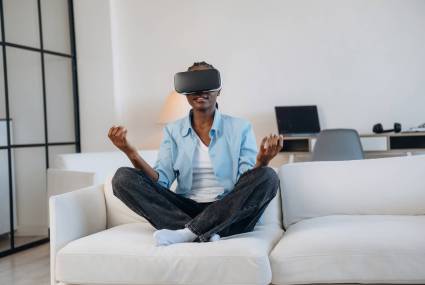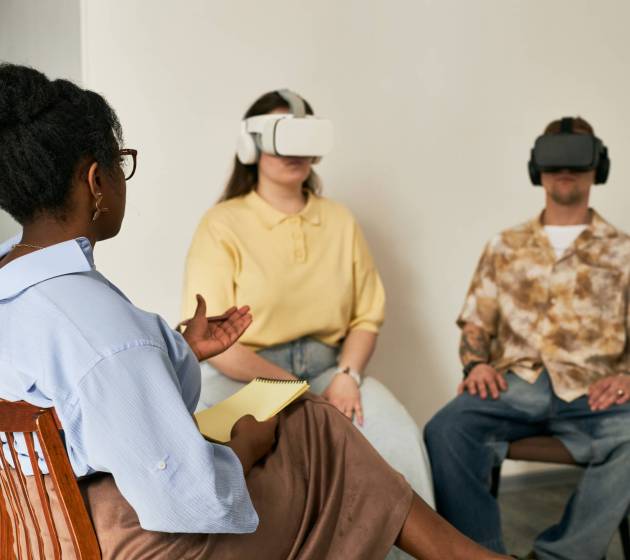Home » Counselling Services » Virtual Reality Therapy
Virtual Reality Therapy
Virtual Reality Therapy (VRT) uses immersive technology to simulate real-world scenarios in a safe, controlled environment. At The Family Psychology Place, we offer VR therapy to help clients of all ages overcome anxiety, phobias, trauma, and more with the support of our trusted therapists and the Amelia Virtual Care platform.


VR Therapy in Calgary
Virtual Reality Therapy (VRT) or VR Therapy is a cutting-edge form of psychotherapy that utilizes virtual reality technology to create immersive and interactive environments for therapeutic purposes. This innovative approach to therapy allows individuals of all ages to engage in simulated experiences that can help them address and overcome a variety of psychological and emotional challenges, including:
- Anxiety disorders
- Phobias
- Relaxation
- ADHD
- OCD
- Mindfulness
The Benefits of VR Therapy in Calgary
At the Family Psychology Place, we utilize the Amelia Virtual Care platform, a leading and highly trusted VR software in our industry. Some of the benefits of VR therapy include:
- Immersive Exposure Therapy – VR can simulate real-life situations in a controlled and safe environment, making it highly effective for exposure therapy. This is particularly useful for treating phobias, post-traumatic stress disorder (PTSD), and anxiety disorders.
- Customization – VR environments can be tailored to meet the specific needs of each individual, allowing therapists to create scenarios relevant to a patient’s concerns. This customization enhances the therapeutic experience.
- Enhanced Engagement and Comfort – Clients often report feeling more comfortable sharing their thoughts and emotions in the virtual environment and higher levels of engagement, which can lead to more productive therapy sessions and a higher commitment to the process.
- Safe Space – In VR, individuals can confront and work through traumatic or anxiety-inducing experiences without the risks associated with real-life exposure. This safe space encourages clients to address their fears and challenges more effectively.
- Real-Time Feedback – Therapists can receive real-time data and feedback during VR sessions, enabling them to assess a client’s progress and adjust as needed. This enhances the therapeutic process and allows for immediate interventions.
- Reduced Stigma – Some individuals may feel a stigma associated with traditional talk therapy. VR therapy offers an alternative that can be less intimidating and more approachable.
- Research-Backed – The effectiveness of VR therapy is supported by a growing body of research, which consistently demonstrates its value in treating various psychological and emotional conditions.
- Skill Development – VR can be used for skill-building exercises, such as communication skills, social skills, anger management, and coping strategies.
- Positive Outcomes – Many individuals who have experienced VR therapy report significant improvements in their mental health and quality of life.
Your Well-Being is Our Priority
Utilizing advanced technology like VR therapy is not just about embracing innovation; it’s about enhancing the quality of care we provide to our clients. We are dedicated to staying at the forefront of the mental health field, and Amelia Virtual Care is an essential part of our commitment to your well-being.
When you choose the Family Psychology Place, you are not only choosing a team of dedicated and experienced therapists but also access to the best tools available to help you achieve your therapeutic goals. Experience the transformative power of virtual reality therapy with our professional team today.
Frequently Asked Questions
How does VR therapy work?
By creating a safe, controlled environment, VRT allows patients to face situations or stimuli that might be challenging in the real world. This exposure, combined with therapeutic guidance, can help patients process and manage their responses.
What conditions can be treated with VR therapy?
VR Therapy has been successfully used for a variety of conditions, including phobias, post-traumatic stress disorder (PTSD), anxiety disorders, and even chronic pain.
How long does a typical VR therapy session last?
VR Therapy is a tool, much like Cognitive Behavioural Therapy. Sessions vary based on the therapeutic goals and individual needs, but typically last between 30 minutes to an hour.
How is VR therapy different from traditional therapy?
While traditional therapy relies on verbal discussions and sometimes role-playing, VR therapy allows for in-session exposures, which makes exposure to feared situations easier outside of the office.
How much does VR therapy cost?
It depends on the length of the session and amount of sessions you’d like. Please contact us at the Family Psychology Place for more information.



